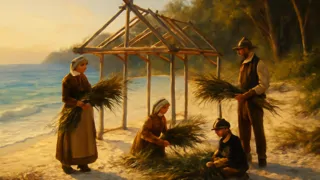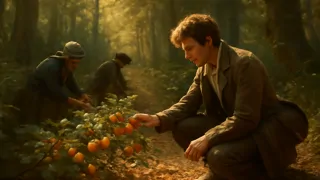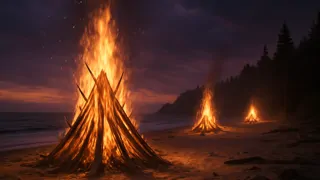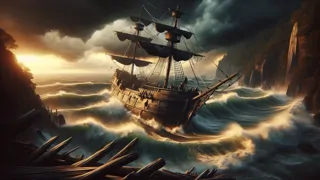Introduction
Before the first pale tendrils of dawn could banish the midnight sky, the Robinson family’s lifeboat groaned beneath their weight as it searched for a break in the relentless surf. Karl Robinson, the patriarch, braced himself at the helm, hair plastered to his forehead by salty spray, as his wife, Anna, struggled to steady the crying forms of Franz, their eldest son, and little Hans, their curious youngest. Between them they clutched a single battered crate of salvaged tools, the only fragments saved from their once-proud vessel. A pair of sailcloth flags whipped like desperate banners in the wind, while darkness pressed from all sides. Each towering wave threatened to slam the frail boat into hidden reefs. Suddenly a monstrous swell crashed overhead, drenching all six with icy water. Karl’s arms trembled as he hauled ropes and barked orders, but his eyes burned with steady resolve. With a final heave, the family beached the lifeboat on a narrow stretch of sand, bodies shaking, hearts pounding, yet blessed by the gift of solid earth beneath their feet. A low fog clung to the beach, veiling driftwood and scattered coconuts, while the distant shriek of seabirds hinted at life hidden in the dark fringe of palms. Gathering their bearings, they looted the crate for hatchets and nails, scanning the shoreline until Karl’s gaze settled on a dense wall of emerald foliage—the frontier where they vowed to rebuild their lives.
Stranded Shores: Forging Shelter from the Wreck
Trembling limbs and ragged breaths spurred them into motion as the sun finally peeked over a distant volcanic ridge, splashing warm gold across the glistening sand. They advanced toward the jungle’s edge, each footstep leaving a faint trail of footprints in soft dunes that whispered promises of fresh beginnings. Anna led the children toward a cluster of palms, their trunks veined like ancient rivers, while Karl shouldered the box of tools with dogged determination. Dense undergrowth surged before them—vines thick as rope, ferns unwinding like verdant scrolls, and twisted roots forming an intricate maze. The forest exhaled a pulse of humid air, alive with the chirp of hidden cicadas and the low hum of unseen insects. Determined to claim a place beneath these boughs, Karl carved markers into young saplings, sketching a crude outline of the shelter he envisioned. Franz, nimble and strong, strapped a piece of sailcloth to his back and darted after fluttering butterflies as pollen danced around his face, hopeful for a sign that this land would sustain them. Meanwhile, Anna scouted the perimeter for a supply of dry wood and sturdy branches. Her sharp eyes caught the glint of a freshwater stream weaving between mossy rocks—a promise of life-giving water. Together they excavated shallow holes to channel the stream closer to their chosen clearing. Hans and Sophie collected bundles of tall grasses and broad leaves, stacking them in neat piles. Hours passed like minutes beneath that leafy canopy until, as the sun reached its zenith, the skeleton of a crude lean-to began to emerge—a testament to their resourcefulness and unity. Though sweat stung their eyes, each struck branch and driven stake was a step toward conquering a world both alien and full of hope.

Once the framework stood firm against gentle gusts, they shredded palms fronds to weave as roofing, securing them with lines of braided vine. Anna taught the children to weave patterns that would repel rain yet allow the air to circulate when the tropic heat swelled. Under her careful guidance, Sophie, nimble-fingered despite her youth, perfected each knot, humming a lullaby to steady her trembling hands. The shelter’s floor, laced with fresh palm mats and cushioned by ferns, took shape, promising solace after a long night. A circle of stones near the entrance marked the hearth where they would coax fire from charred wood, and beneath an arc of taller palms they stretched their battered sailcloth like a canopy against the inevitable storms. As a warm breeze carried the scent of salt and blossoms through their burgeoning camp, the Robinson family paused to admire what they had wrought: a fragile stronghold, but undeniably theirs.
As twilight approached, a symphony of crimson and violet swirled above the canopy, and the family gathered beside their lean-to to complete the final touches. Karl hammered in extra stakes and reinforced the corners of the shelter with lengths of driftwood rope they had fashioned from shredded linen and palm fibers. He fashioned a simple pulley from bent bamboo and a sturdy vine, ingeniously hoisting a salvaged barrel to serve as a closed pantry above reach of curious island creatures. Anna laid out an assortment of provisions—dried fish wrapped in cloth, a handful of grains, and the few strips of cured meat that had survived the wreck—while instructing Franz to stoke the fledgling embers into a small fire that danced in a semicircle of stones. The sparks spiraled upward, shimmering against the emerging stars as if drawn to the promise of rescue. Nearby, Hans balanced precariously on a moss-covered log as he experimented with an improvised fishing rod, whittling a hook from a piece of bone and tying line with meticulous care. Sophie, determined to leave no corner bare, arranged stacks of fallen leaves along the walls of the shelter to fill gaps and shore up insulation against nighttime chill. Their collective efforts bore fruit in the form of a cozy nook that lulled their weary bones towards rest. As they shared their first humble meal on island soil—salted fish crisped over flame, teeth sinking into flaky flesh laden with smoky perfume—Anna clasped Karl’s hand and met his eyes with unspoken gratitude. Under the canopy of glittering stars, the island settled into a gentle hush, broken only by the soft crackle of the dying fire and the distant murmur of ocean waves. The shelter, imperfect yet resolute, stood as the first chapter of their new life—a testament to perseverance, ingenuity, and the unbreakable bonds of family.
Taming the Wilderness: Tools, Fire, and Foraging
At sunrise on their second day ashore, Karl began fashioning tools that would become indispensable to their survival. He spent hours examining morsels of metal salvaged from the wreck—rusted nails, a fragment of a compass, and a battered iron cooking pot—envisioning each piece’s potential. On the edge of a rocky outcrop, he wedged an unsharpened blade against a ledger of smooth river stones, laboring to hone a crude axe blade. Each spark that flew off the flint stung his calloused hands, proof of progress and purpose. Watching closely, Franz swept aside layers of deadwood to reveal a bed of tinder: dried grasses, brittle bark, and clusters of resinous seedpods. Together, they tested different friction methods until Anna stumbled upon a technique that coaxed life from embers. With gentle breaths, they nurtured a flicker of flame—so fragile it threatened to smother under any careless gust. Once kindled, the small fire glowed with a warm, hungry appetite, turning damp twigs into crackling fuel. Under its shifting glow, Anna boiled seawater in the iron pot until wisps of vapor rose, leaving faint crystals of salt in the bottom. Hans, ever eager to help, gathered smooth river pebbles to lay around the fire pit, providing a sturdy ring that shielded the embers from wandering sparks. Sophie, her fingers nimble and sure, braided lengths of strong vine into ropes that could hoist buckets of water from nearby pools or lash freshly cut timbers together for construction projects. By midday, the family had assembled a modest workshop beneath the leaning palms, its walls lined with carved tools, fishing hooks, and coils of twisted fiber. In those moments, the island ceased to be a bewildering wilderness; it transformed into a vast resource waiting to be unlocked by their combined skill and determination. Emboldened by their success, Karl replaced familiar tools with new contraptions made from driftwood and bone: a sickle for harvesting vines, a sturdy spear tipped with sharpened metal for future hunting, and a rake-like implement for sifting sand in search of hidden clams. Each innovation sprang from the island’s raw materials and their indomitable will, bridging the gap between the unknown and the life they were determined to sustain.

As autumn’s chill settled over their memory of Swiss valleys, this tropical isle presented surprises at every turn. When Anna and Sophie ventured inland, they wove through stands of towering banana trees and vibrant shrubs heavy with fruit—a feast of breadfruit, mangoes, and clusters of guava that hung like jeweled lanterns in the warm air. Anna consulted small journals of botany they had rescued, marking each species with cautionary notes: which berries bore swift beauty and which hid bitter poison. Guided by her charted observations, Sophie plucked the reddest fruits and placed them gently into woven baskets. Simultaneously, Hans erected a network of simple traps along animal trails, crafted from slender branches and tensile vines. He was rewarded by the rustle of small rodents caught unawares, which he delivered to his father for inspection. Karl, skilled in using minimal resources, carved smoking chambers from empty barrels, preserving meat with slow embers until it bore a pungent aroma. In the water that lapped against their beach, Franz had set sharpened stakes along a shallow reef, fashioning a fish trap that guided shoals of silver-scaled fish into a natural corral. No longer was the sea an implacable barrier but a generous larder, brimming with mullet, snapper, and lobsters lurking in rocky crevices. At twilight, when the salmon-pink sky spread across the horizon, the family feasted on a banquet of their own making: salt-dusted fish grilled over open flame, wild greens simmered with fresh coconut milk, and fruits that tasted of sun-warmed promise. Laughter and gratitude rose together, echoing into the jungle like a celebration of life reborn from adversity. With each meal, the Robinsons refined their knowledge: tasting, testing, and teaching one another the subtle differences among brightly colored flora. These lessons forged an unspoken pact between human ingenuity and wild abundance, sealing their confidence that the island could blossom into a true home.
As the days stretched into weeks, the Robinson family’s settlement evolved from rudimentary shelter to a thriving homestead perched above the tide. Under Karl’s direction, Franz and Hans cleared a nearby ravine and funneled rainwater into a series of scrubbed wooden barrels, ensuring a steady supply even when the island sky fell silent. They hewed tall bamboo poles into support beams and raised a second-story platform above the ground, granting reprieve from damp earth and curious wildlife. Rope bridges swung between sturdy palms, connecting living quarters to an elevated lookout that offered sweeping views of coral reefs and distant shipping lanes. Here, Anna hung strips of salvaged sailcloth to dry newly woven mats, while Sophie organized trays of sun-dried fish and dehydrated fruits onto slatted racks. At the base of the lookout, Hans discovered a cluster of wild honeycombs dripping with golden nectar, and though cautious, he harvested small portions under his mother’s watchful eye, celebrating the sweetness of nature’s hidden treasures. With each triumph of architecture and resource gathering, the island felt less a stage for survival and more a canvas for their collective creativity. Even the youngest child, Greta, found joy in mapping tiny creatures—her notebooks blossomed with sketches of colorful insects and amphibians that seemed to thrive around their ramshackle paradise. When Karl placed the final carved sign at the entrance—reading simply “San Salvación” in rough, yet loving strokes—they gathered beneath it, hands clasped, to salute the home they had hewn from shipwreck and uncertainty.
Signals in the Sky and Lessons Learned
As summer waned and the Robinsons’ routine solidified, the thought of rescue flickered persistently at the edges of their days. Karl knew that the island’s remoteness made unassisted escape improbable, so he resolved to cast a signal broad enough to pierce the horizon of the sea lanes. He began by polishing a large section of copper plating from the wreck with pounded sea stones until it shone like a terrestrial sun. When morning light caught its surface, beams of brilliance could reach distant sails. Adjacent to the makeshift dock, Franz and Sophie erected a towering scaffold of interlaced bamboo, reinforced at each joint with thick vines. Anna braided coils of bright fabric from scraps of sailcloth, draping them in strips that fluttered like flags across the structure. Beneath the highest platform, they lashed a rusted stove mirror, angling it to direct sunlight toward passing vessels at dawn and dusk—the most likely times for ship traffic. Hans, brimming with excitement, scavenged clusters of resinous pine sap to build a fire kit, whipping up puffs of black smoke that could billow hundreds of feet into the sky. On a sheet of driftwood they painted the letters S-O-S in bold black pigment, leaning it against the bamboo frame. Over the coming days, they maintained a vigil, stoking smoldering piles of brush to keep the smoke thick and mounting the mirror daily to glimpse ghostly reflections of distant sails. Through trial and error, they perfected a rhythm of signals: three puffs of smoke, a flash of polished brilliance, and the repeated wave of vivid flags, composed in code that any passing mariner would recognize. When the golden sun dipped below the horizon, they lit torches forged from resin-rich wood, their flames roaring like drifts of fire along the beach—a visible plea to any soul traversing the endless blue.

Their persistence began to bear uncertain fruit one crisp dawn, as Franz stood at the lookout scanning a distant line where sky met sea. At first, it was only a slender curl of white—an unremarkable cloud hanging above the horizon. But Anna, ever alert, gasped as she traced the shape to a silhouette of a ship’s hull, its sails unfurled against the rising sun like giant ivory wings. She summoned the others, and Karl seized the polished mirror, angling it until a searing beam danced across the water. The ship’s crew must have noticed, for its pace altered and the sails flapped with renewed energy. Excitement erupted, yet as clouds gathered and a squall rolled in, the vessel dipped behind waves and was swallowed by mist. Their hearts sank, tempered by the sudden absence of any trace. Nevertheless, this fleeting encounter reinforced their faith. Over subsequent weeks, they watched whitecaps arrayed into distant hulls at dawn’s first light, only to be obscured by swirls of rain; they learned to keep fires burning longer, to replenish flags after each storm, and to fan glowing embers at twilight when the sea lay calm and dark. Even when days of silence stretched between glimpses of sail, they refused to abandon their watch, building small shifts so that at least two family members were always alert at the mirrored lookout. Each time a spark of hope flickered, it fueled their collective resolve—proof that across the vast ocean, another world still held them in memory.
By the time the Robinsons marked sixty days on the island, their hope had matured into a calm certainty that rescue would come. One misty morning, Karl heard the distant rumble of an engine unlike the lilt of wind or the call of birds. He grabbed a hastily braided rope, pulling Hans and Franz down the scaffold in breathless haste. Anna stoked the largest fire, stirring thick coils of white smoke that drifted lazily before catching a gust that carried them out over the water. Sophie gathered the brightest flags, her slender arms straining to wave them as high as possible. A swell in the ocean revealed the dark line of a hull, its shape unmistakable: a merchant brig bound from distant ports, cresting a gentle sea swell like a gleaming phoenix from cobalt depths. Cheers erupted from the beach—raw, unrestrained—and the family stood side by side, tears mingling with sweat as they watched the ship slow to a crawl just beyond the breakers. Moments later, a small boat was lowered, and within the hour, the brig’s crew lent an ear to their tale of survival, marveling at the ingenuity they had witnessed. Karl embraced the captain with heartfelt gratitude, while Anna offered carefully saved rations and fresh water in thanks. As the ship’s gangplank was drawn alongside the waterlogged dock, the children hesitated, torn between awe at the world beyond and longing for the simple rhythms of their island life. Karl lifted Hans into his arms, promising that this chapter—though soon to end—would endure in their hearts. When the Robinsons stepped aboard at last, the deck creaked underfoot like a bridge between two worlds. They waved farewell to the lookout scaffold and the shelter that had sheltered their fears and carried their dreams. Yet as the brig cast away from the shore, they turned one last time to the lush green expanse that had been their crucible and their sanctuary.
Conclusion
Throughout their ordeal, the Swiss Family Robinson exemplified the power of unity, creativity, and unwavering hope against the vastness of nature’s unpredictability. From the moment they clung to their battered lifeboat in the storm’s fury to the triumphant signal fire that carried their plea across open seas, every step of their journey was a testament to human perseverance. They transformed wreckage into shelter, wild forests into abundant larders, and fear into the determination that ultimately secured their rescue. More than a tale of shipwreck and survival, their story is a portrait of family bonds strengthened through adversity, a reminder that courage can be forged in the crucible of challenge. As the merchant brig’s deck creaked beneath their feet, the Robinsons left behind more than footprints in the sand: they carried with them the lessons of San Salvación—lessons about resourcefulness, respect for the natural world, and the beauty of shared purpose. Each carved palm shelter, every carefully hoisted line of rope, every meal drawn from tropical bounty spoke of lives renewed through collective will. Their journey across the ocean’s fury left them with more than a rescue; it gifted them a home within themselves—one that would forever reflect the uncharted possibilities discovered on that remote tropical isle.

















